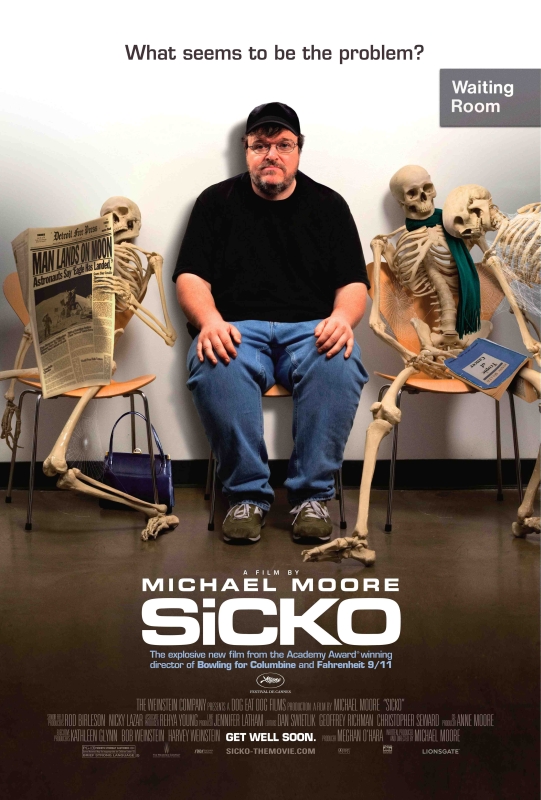 So the other night, I watched "Sicko," the documentary about healthcare by Michael Moore. I was expecting a great documentary, due to the popularity of Moore and the number of awards he has won. And I got even more than I expected.
So the other night, I watched "Sicko," the documentary about healthcare by Michael Moore. I was expecting a great documentary, due to the popularity of Moore and the number of awards he has won. And I got even more than I expected.
First of all, I would like to say that I supported a universal healthcare system before I watched the movie. What I was really looking for were some facts and statistics to back up my ideas, rather than the simple belief that healthcare is something that everyone deserves, no matter their income level, like education and protection by the law.
But the film was focused much more on individuals and their experiences with the healthcare systems in the USA and abroad, which were actually quite interesting. A lot of people have had bad experiences with the American system, including employees of big insurance companies. These accounts were quite moving, as they exposed how greedy and profit-driven the companies really are, as employees would get bonuses for turning down the highest number of customers' claims. There were also people who were victimized by the system, and had lost loved ones or been sent into poverty due to the greediness of the HMO's.
There were some statistics, however. A lot of them were interesting, such as that the USA has 50 million people (about 1/6 of the current population) living without healthcare. That the USA is ranked #37 in the coverage of its citizens, below small and poorer countries (France being #1). Some of the statistics were so outrageous that I did not even believe them, such as when Moore states that the US's infant mortality rate is higher than in most other industrialized countries. I looked up the fact later, and it is true that the US is rated below all developed nations but Latvia in the number of children who die in their first month of life.
After I discovered this, I appreciated Moore's work much more. He showed some very shocking facts, which show how poor the health of our nations really is compared with countries with socialized health care. He also showed the perspective of Candians and British citizens and doctors, to refute the claims that socialized healthcare is poor, slow, or bad for doctors.
And perhaps my favorite part of the movie was when Moore points out how many things in this country are already socialized. Americans' irrational fear of socialism, and how it will lead to *gasp* communism seems to be one of the main blocks of universal health care. But so many things are already provided by the government, such as police, firefighters, libraries, education, and the postal service. These are things that are deemed necessary for society and as rights for citizens, yet they could easily be privatized. So why is it that health care doesn't make the cut for the list of government-provided services?
The only negative I could find with the film was that Moore glorified universal health care more than it probably deserves. He made it seem as if it was a perfect system, praising Cuba for having socialized health care, and made it seem as if it was better to live in Cuba than in the US. As I said above, I support government-run health care, but I don't think it's a perfect system. Everything has some pros and some cons, and even if socialized health care is better than privatized, that doesn't mean it is perfect.
All in all, this is a great movie and I highly recommend it. It is quite depressing at parts, but it's both thought-provoking and entertaining. And as it is said in the film, this issue isn't a partisan one. Even members of the Conservative Party in Canada and Great Britain support universal health care, as it is a basic human right. If we can unite behind universal suffrage, equal protection under the law, and equal education, why not health care?





2 comments:
I really really enjoyed this movie too, after thinking it would just be ok. They did a great job personalizing the problem and making you feel terrible for these people, although they did kind of glorify universal healthcare a little more than it deserves. Great article, i completely agree with you
Post a Comment